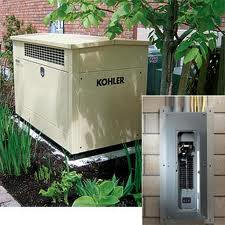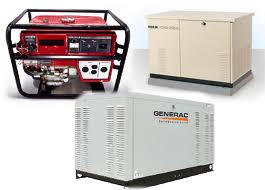Below is more information, additional guides and reviews of residential and commercial generators, safety recommendations and other resources you need to make an informed decision about the best emergency back up generator for home or commercial use. Always remember a standby unit should always be installed by a licensed and insured electrician. Call us today at 877-535-6661 for a free estimate.
HOW TO CHOOSE A GENERATOR
Home generators can be portable or stationary (standby). They run on a variety of fuels, such as gasoline, diesel, natural gas (NG), and liquefied petroleum gas (LPG). Portable gas models are generally cheap. For a long term emergency consider standby units. They can provide continuous power because they are hooked up to an external fuel source, such as natural gas line. Some portable devices can also be fueled from an external source and can therefore provide extended run time too. Commercial/Industrial generators are stand by units.
SELECTING THE FUEL
Your choice of fuel should be determined primarily by the fuels available in your area. Most residential generators are bi-fuel and can run on both natural gas and LPG (casually called propane). You will normally need a simple field adjustment to convert from one fuel to the other. If like most homes your house is already supplied with gas, or if LPG is readily available in your area, a bi-fuel NG/propane generator is your logical choice. Boston electrician installs residential commercial generators.
GENERATOR INSTALLATION
Normally, a stationary generator is mounted outdoors on a cement pad, preferably near the fuel source. Many models already come with a mounting pad, but you still need to prepare a location that is flat and has provisions for water drainage. To prevent exhaust gases from entering a home or business, locate the unit in a well-ventilated area away from doors or windows. Call Sylvia Electrical for a free estimate and to discuss your generator needs. Electrician Boston, Peabody, Fitchburg.
HOW TO WIRE YOUR SYSTEM
A standby power backup device connects to the home or business wiring via a transfer switch. The transfer switch prevents "back-feeding" into utility lines (which is dangerous and illegal). Many standby generators come with a pre-wired transfer switch. It is strongly recommended that all electrical connections be done by a licensed electrician. in Boston, Peabody, Fitchburg or electrical contractor
We would be happy to discuss all your generations options with you. Call us today! Don't be left in the cold.



Nice article, thanks for the information.
ReplyDeleteElectrical Contractors
I found so many interesting stuff in your blog especially its discussion. From the tons of comments on your articles, I guess I am not the only one having all the enjoyment here! keep up the good work... Toronto General Contractors
ReplyDelete